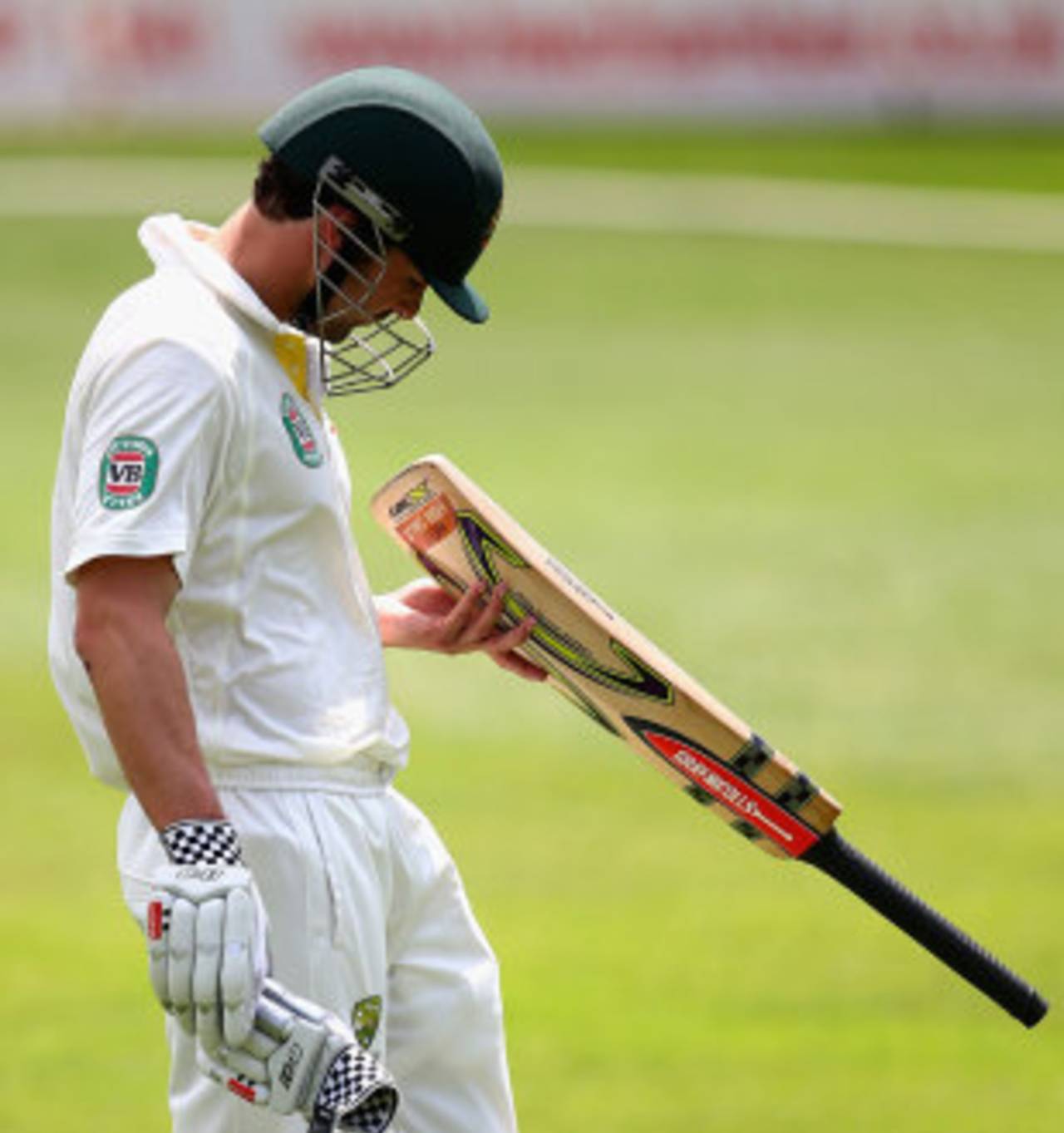It will be the earnest hope of every Australian batsman that some of the most significant moments of the visit to Worcester took place not on the field at New Road but in the dressing room. There, for about an hour after play on day two, the tourists engaged in a frank and occasionally spicy batting meeting. Views were shared between players, the captain, Michael Clarke, and the coach, Darren Lehmann. The question of how best to go about batting at Trent Bridge, and the topic of handling swing bowling, were both robustly confronted.
Success or failure in the Ashes series will depend largely upon the ability of a much-doubted and debated Australian batting order to stand up to English pressure, and not fall prey to the moving or spinning ball. As befits his knack for catching the essence of the thing, Lehmann translates the matter to a simple maxim: many more hundreds have to be made.
Among numerous set ambitions Lehmann brought to the coaching job, his desire to drive his players to more centuries was prominent. He wants an absolute minimum of one per Test. Given that Australia managed only one for the entire series in India, to Clarke in the first match at Chennai, it is abundantly clear how much work needs to be done.
"We want a hundred every game, possibly two if not three, that would be great," Lehmann said. "Hundreds will count and that's a big thing for us. I don't think we've made enough hundreds as a batting unit for a long period of time now, there's probably only been a couple in the last few Test series and Michael's made most of them, so we need to make more hundreds as a unit definitely, for us to get to where we want to go to.
"Test cricket we know is going to be a lot harder than the tour games we've played, we're not shying away from that fact, we know we have to bat better. I think we batted really well with good intent and aggressive and all the things we talk about, but there are going to be times in this Test series where it's not going to be as easy I'm sure. We're going to have to find ways to make runs and that's what we've been working on, for Nos. 1 to 11."
Coming from two seasons of state coaching with Queensland, Lehmann was very aware that the supply of three-figure scores had dried up across the country. For most of last summer only the 30somethings - Ricky Ponting, Brad Haddin and Chris Rogers - had notched more than one apiece in the Sheffield Shield.
They were belatedly joined by Joe Burns and Jordan Silk in the closing weeks of the season, the latter's two centuries enough to vault him onto the Australia A tour having only debuted for Tasmania's Shield team in February. Lehmann pointed out that Rogers' elevation to be part of the Ashes squad arose largely through his ability to churn out telling scores. In the case of Phillip Hughes, 21 first-class hundreds demonstrate that he has the hunger to get them even if his technique does not always convince.
"I think it's [a problem] right down the line to be perfectly honest," Lehmann said. "In state cricket we haven't seen enough hundreds, guys coming through have got to make more hundreds. You've seen Chris Rogers obviously make a lot of hundreds, last year in the county system and now he gets his chance in the Test match. It's a big thing for us as a team to make hundreds, it'll make our bowlers' job a lot easier, and we'll make bigger scores."
One of the touring team's most troubling cases is that of Ed Cowan, possessed of an accumulator's method that suggests he should reach three figures regularly. It was with a scoring sequence of 134*, 145, 10, 65, 145* and 109 in the lead-up to the 2011 Boxing Day Test against India that Cowan won his international berth, but since being given his baggy green cap he has made only one century in Tests - against South Africa in Brisbane last year.
Lehmann acknowledged that Cowan had left his place open to conjecture by repeatedly failing to go on to big scores, the latest a typically middling double of 58 and 34 against Worcestershire. "He got some runs, you'd love him to make some hundreds and put his position beyond any doubt at all," Lehmann said. "But we've just got to sit down and work out whether he's in that top six or not."
The meeting at New Road was emblematic of the focus Lehmann and Clarke have committed to the issue of making significant runs, their urgency increased by the knowledge that when the Australians walk out for the national anthems before the first Test at Trent Bridge, they will be facing a team steeped in the art of century-making. Alastair Cook (25), Jonathan Trott (9), Ian Bell (17), Kevin Pietersen (22) and Matt Prior (7) are all better versed at compiling tallies that are not merely handy but monumental.
So when Lehmann speaks of England's batsmen it is not only of their weaknesses but also of traits his side can - nay, must - learn from. "We know them pretty well because they've had a similar side over a period of time now, which is an advantage I think," he said. "For us it's case of making sure we've ticked all those boxes and actually making sure that we're ready to go. So we are talking about cricket, about each player, doing everything behind the scenes to make sure we implement that in the game."
Daniel Brettig is an assistant editor at ESPNcricinfo. He tweets here
